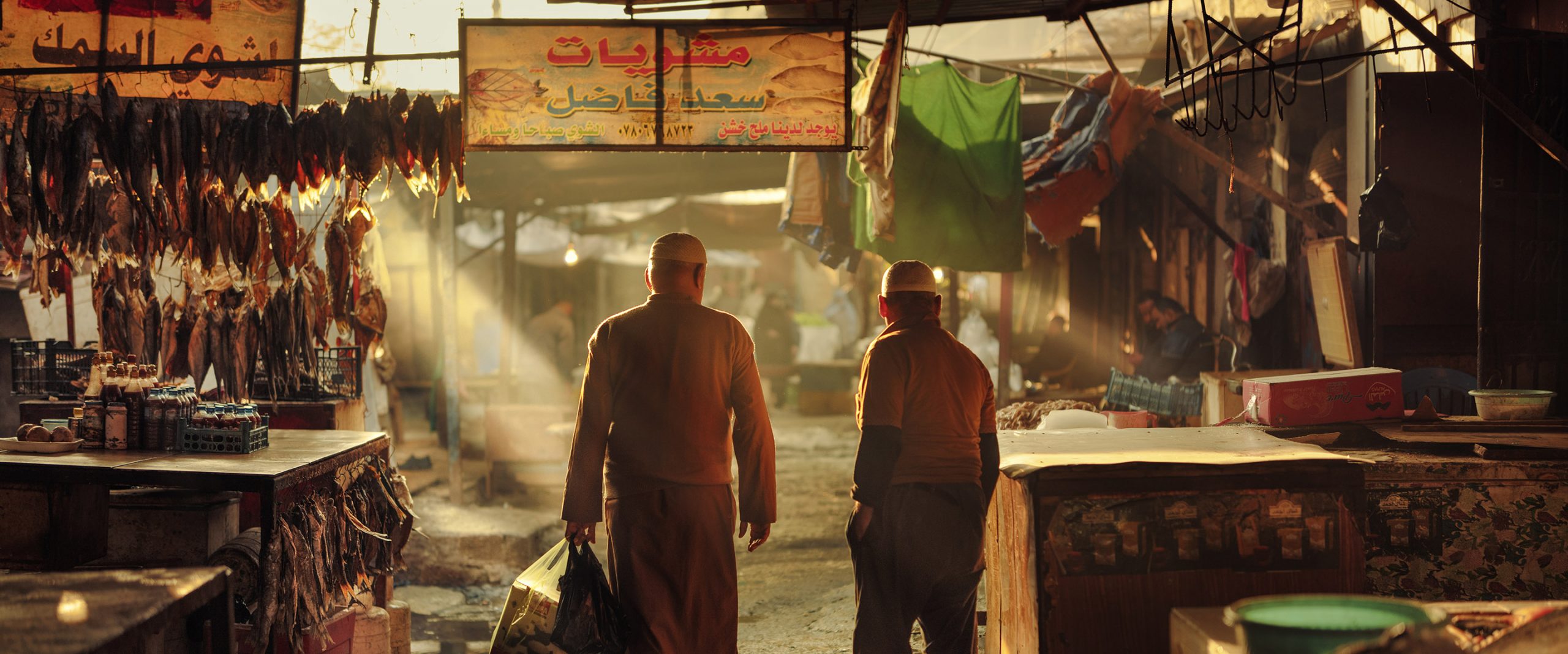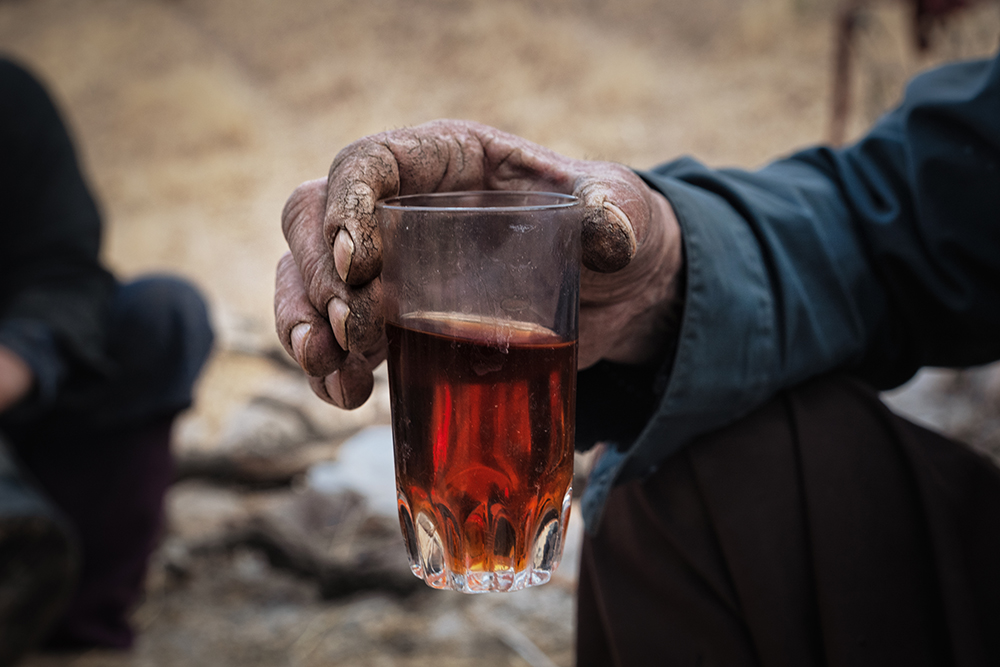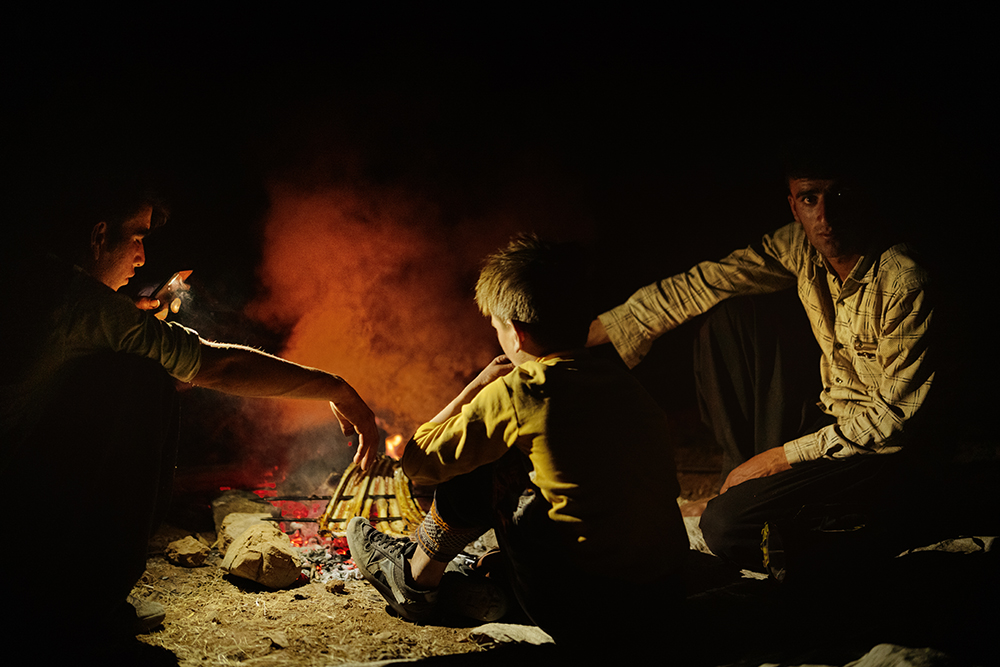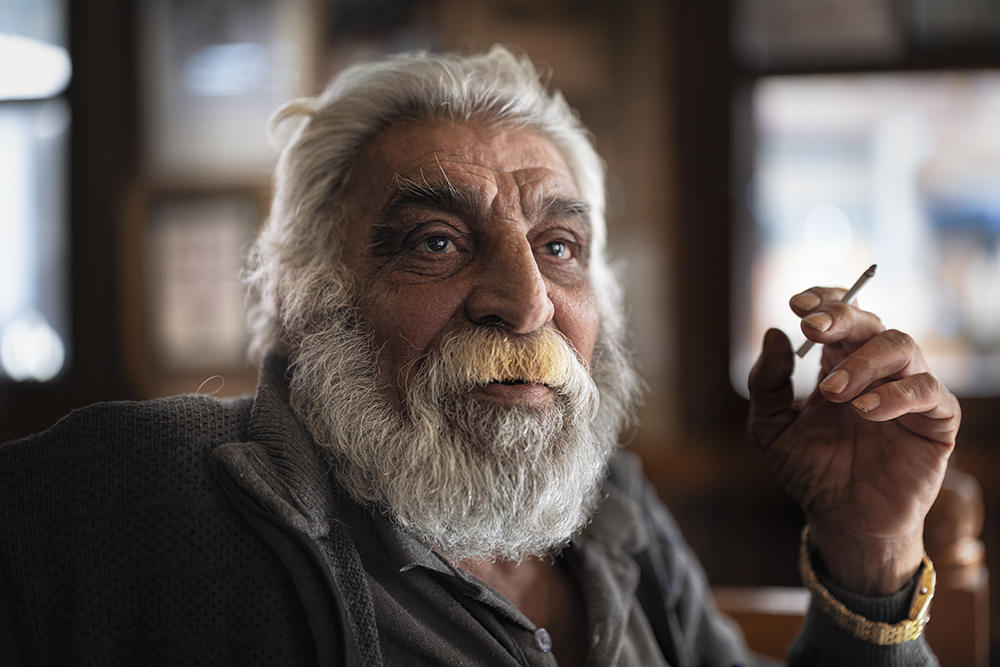"I think I've earned respect through eating food. Sometimes, there have been things that I'm not particularly excited to try, but I eat them anyway because to do otherwise would have been a sign of disrespect." Partaking in the impaled remains of a sheep may not have been within the realm of her everyday dietary preferences, but for photographer Emily Garthwaite, the intimate privilege of being let into her subjects' lives is one that she never takes for granted.
Her regard for these individuals is apparent as she recalls watching members of the family, with whom she was dining, "passing down platters of ribs and grilled, very fatty meat down on to the rug," each of them unable to contain their excitement. While Garthwaite finished every single one of the proffered ribs, she confesses to not, at the time, having enjoyed it "at all." She woke up quite ill the next day because her stomach, "is nowhere near being used to digesting that much fat - and pure fat at that." In retrospect, this was a small price to pay because she found that she had earned more than just an honorary place at the table.
The act of growing food has the potential to awaken people to much broader questions about the way in which it is a shared humanity
It's hard to believe Garthwaite when she says that it took "about three years to work out what aperture was" but it is perhaps this degree of deliberation over technique that has come to be associated with her distinct style of slow photography and storytelling. She is as consumed by the art of representation as she is with the lived experience of shared humanity, religion and displacement - themes that have come to define her work and have earned her a place on the Forbes 30 Under 30 list and as a Leica ambassador. Her work has been exhibited internationally at the World Economic Forum in Switzerland, The Natural History Museum in London and, more recently, at EXPO 2020 in Dubai.
Garthwaite looks back at the three stages of her self-taught journey in photography through a lens of self-awareness - one that can only preoccupy those who inhabit every aspect of their art. The first stage, she says, is about, "seeing an image, but not being able to capture it with your camera and the frustrations that come with knowing the exposure is wrong or that it's too blurry." This graduates to the second stage of when you can see a picture opportunity and photograph it, "but you photograph every single angle because composition and your understanding of how exactly to bring things to life is still a learning process." The final milestone that marks this trajectory, according to Garthwaite, is when, "you're able to see the angles and you've already done a sort of 360 and gone okay, there it is, and all this is happening at a great speed."
What sets these rites of passage apart from Garthwaite's present-day visual sensibility, however, is that her "willingness" to press the shutter is no longer the same. She speaks of the predicament that confronts the best of photographers at the onset of their career. "I used to take photographs in a panic because I worried about missing something but ultimately, you end up missing out, if you're in a panic. You've just got to breathe, be calm, enjoy yourself, and be meditative about the process."
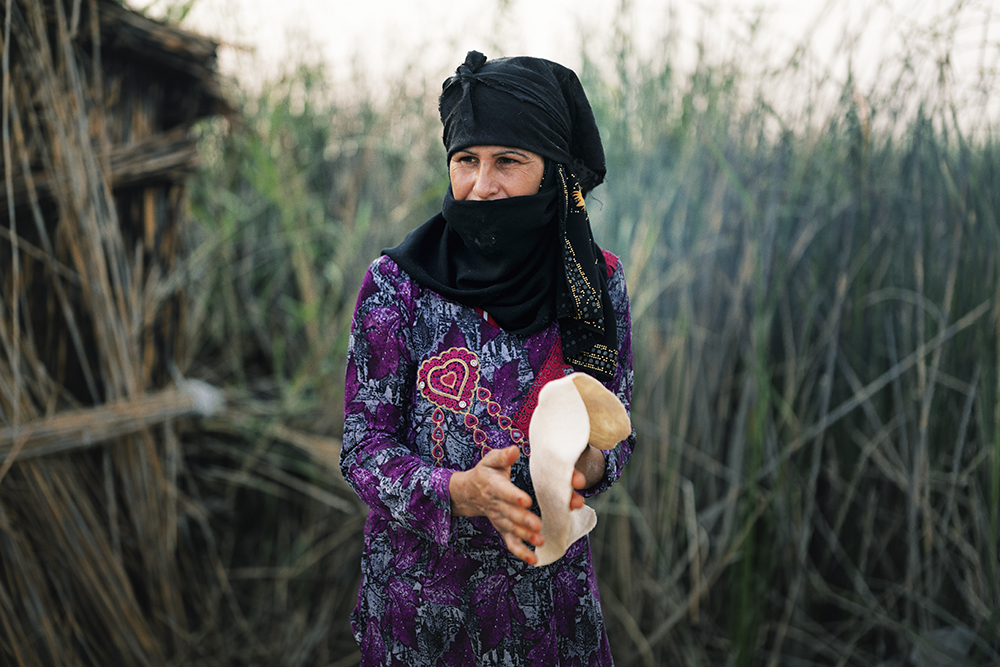
Umm Jassim prepares traditonal flat bread for her family using a mud oven in the Hammar Marshes, Iraq.
The frantic sense of urgency that governed the early days of her learning process has given way to a deep-seated need to dedicate her time to "one place and understanding it" and may be a factor that has prompted her to set up base in Erbil, the capital of Iraqi Kurdistan. She professes to love the Kurdistan region of Iraq, and southern Iraq, and having the opportunity to spend as much time in the community as she does. Walking has proven to be the unassuming mode of entry through which Garthwaite chooses to gain ground while accessing what are most often perceived as "closed" cultures.
In fact, it was an invitation to walk and photograph Arba'een - the world's largest annual pilgrimage and a Shi'ite religious observance to commemorate the martyrdom of Al-Husayn ibn Ali, the grandson of Prophet Muhammad - that stirred her interest in the region in 2017. Literally translating to "forty" in Arabic, the event draws up to 25 million Shi'a Muslims every year. Pilgrims walk 50 miles between the holy cities of Najaf and Karbala, converging in southern Iraq, to recite the Ziyarat Arba'een prayer, forging a sense of community alongside their unwavering belief. She is emphatic when she says, "When this opportunity arose, to photograph a walk of peace with the Shi'a Muslim community, I just thought this was exactly what I wanted my life and work to be about. I wanted to learn about the Shi'a Muslim community in their sacred space, on their terms."
Garthwaite confesses that growing up in the UK, her understanding of Iraq was "limited." All she knew was that it was, "probably somewhere you shouldn't go because it wasn't safe and why I felt most driven to go there." She was excited to walk and "not be stuck in a car," but most importantly wanted to treat the pilgrimage with the sensitivity it deserved and not focus on the scenes of ritual flagellation that so many other photographers showcase "without understanding the nuance." With a philosophical pragmatism she states that, "everyone's journey to god is different."
Whether attributed to climate change or just "movement from village to village", Garthwaite is fixated upon the way people move across land and, more specifically, "how someone travels by foot." She is quick to draw attention to the fact that she does go to areas, "that face conflict and a lot of difficulties, but my interests lie beyond that - beyond a headline and beyond conflict." Her website states that she has charted over 650 km through Iraq (she adds a recent three-month long, 2,000-kilometre boat expedition to the logbook), capturing untold stories of contemporary Iraq and its land and people. Garthwaite's work has spanned pilgrimage, and the "demonization" of the Shi'a community, and shifted towards looking at the way people who were impacted by airstrikes and land mines and displacement have moved across land in the north of Iraq.
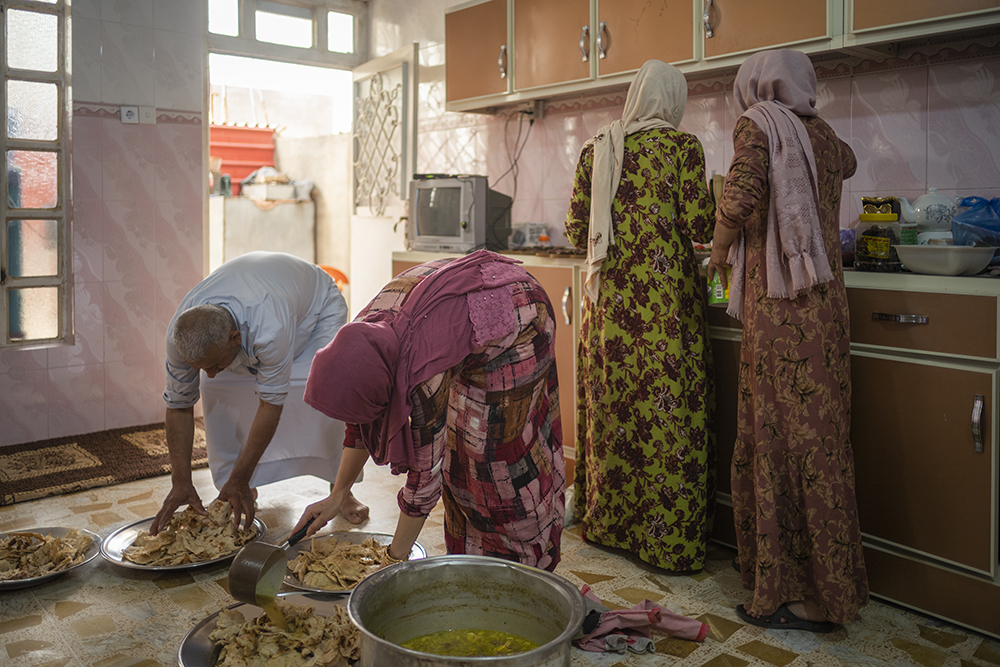
Women prepare tishreeb, a traditional dish of shredded bread, rice and chicken broth, in Tikrit, Iraq.
Although walking may have allowed her a unique vantage point, food has proved to be one of the most generous and lesser-known equalizers in her journey as a photographer. It is the element that could risk being overlooked but has granted her access to women's spaces in rural regions in Iraq - "where women cooked, I helped, and we were able to connect through shared duties" - while co-directing The 40th Day, a documentary covering Arba'een. Food is the key to navigating the unspoken cultural nuances of etiquette such as the playful back-and-forth volley that is taarof, which has resulted, rather comically, in Garthwaite accepting invitations to tea that were only extended out of politeness.
While traversing Arba'een, Garthwaite arrived at the resounding realisation that, "food among weary, dusty pilgrims is absolutely essential." It was also her first immersion into Iraqi culture and the humble manner in which food was served among the local community in Babylon and Hilla, "where for 40 days, people along those routes open up their homes and their hospitality is such that they give food every single day to people." She speaks of silver trays heaving under the weight of mounds of rice and mutton, "with salads, nuts and seeds, and big bowls of fruit at the end." It is, according to her, generosity on a scale so unimaginable with households sometimes slaughtering up to two sheep a day, depending on their incomes. "There is plenty for the needy, vulnerable and widows."
Food can tell the story of grief, disenfranchisement and a lack of agency
Food, emphasizes Garthwaite, "is the key to storytelling and a great way to have a safe conversation, particularly in Iraq and the southern part of the Kurdistan region, where lots of people - and their parents and grandparents - have been through incredibly traumatic things." It often serves as the primer into more difficult conversations or of those of being displaced and she says that she and her partner have found that, "the best way to start getting information is halfway through a meal, where maybe a notepad will come out and we'll ask people to tell us a story about the moon or the rain or when they last felt at peace and then, something will open up, and it will be an almost spiritual conversation around their life."
There is a non-negotiable degree of respect she extends towards those she interviews and she is vocal about the fact that she never "prods" as she isn't there with the intent of conducting an investigation. Her interest is centered around creating a long-term body of work around "intangible heritage and culture." The most beautiful part of this process that has been stimulated by food and memory is that sometimes, even if people were to ask her not to record what they were talking about, they would have, in those 15 minutes, "shared in confidence, insights that will inform all my work because they may express a universal feeling, I have witnessed across communities."
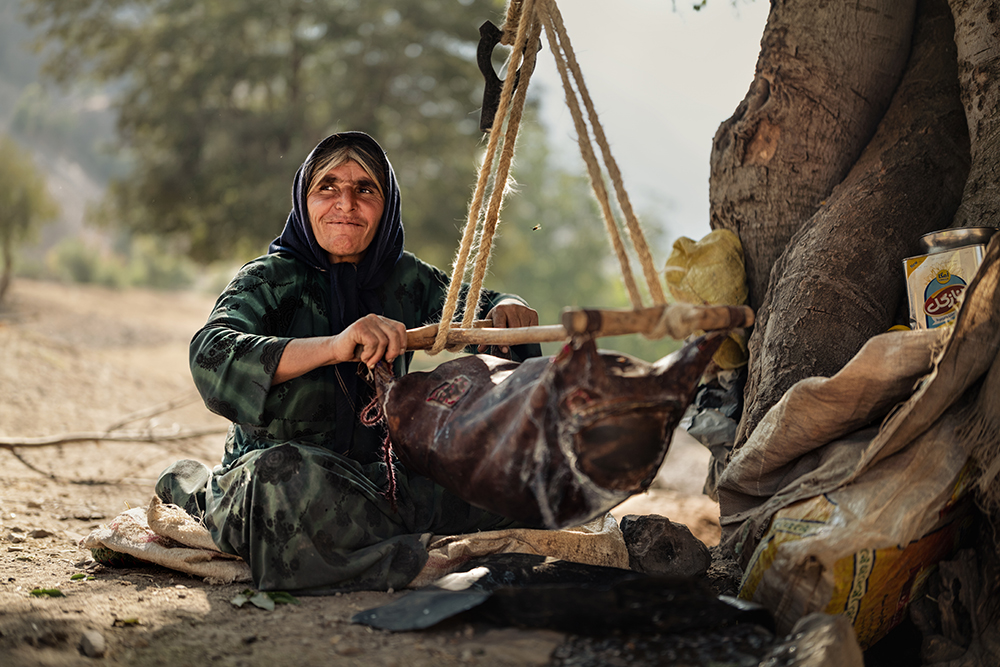
Jahan preparing butter from yoghurt inside a leather bag known "khig". This traditional practice involves shaking the bag to separate the fat from the yoghurt. The sour yoghurt that remains is called "dough" and is drunk with most meals.
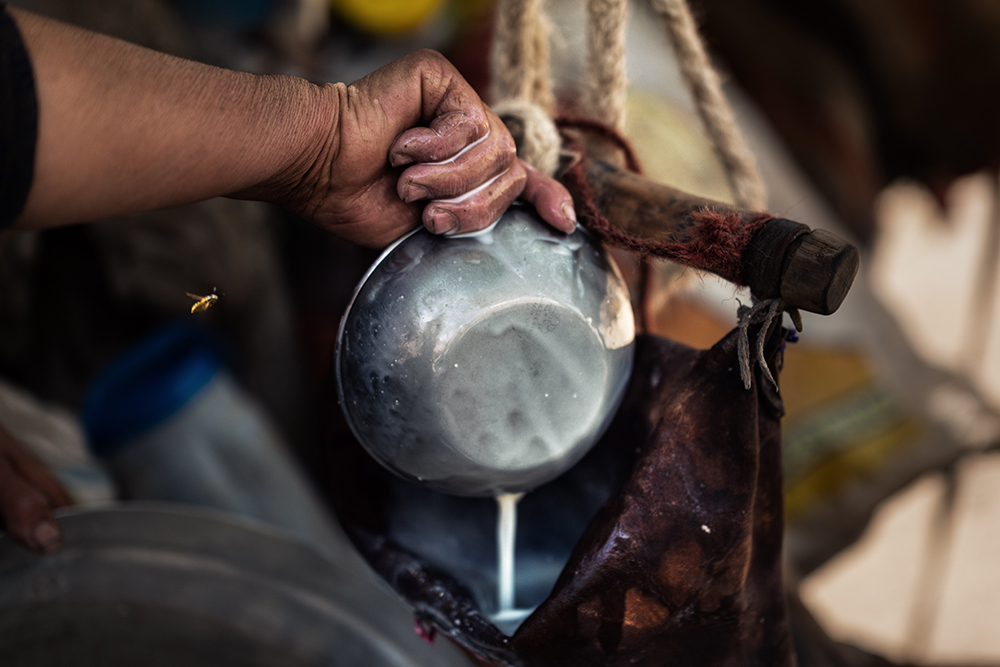
Jahan seperates the fat and milk. She pours the remaining goat's milk into a leather bag known as "mashk".
Food can tell the story of grief, disenfranchisement and a lack of agency when reporting from conflict zones, as in the case of Ahmad, "an entirely displaced person from Mosul, who had fled during the war and was living in a refugee camp." During an interview with Garthwaite, Ahmad recalled a time when his family had been starving and people had taken to eating dogs off the street. They were down to the last remnants of food, with just enough flour to make a bit of bread, and limited water supplies. He was hiding out in a house with twenty of his closest family members in an ISIS-controlled area when they heard the clip-clopping of hooves echoing across a silent, bombed road. Members of ISIS had arrived with a horse. They proceeded to slit its throat and allowed it to bleed out, subsequently beckoning people to come and buy the meat. As head of the family, he bought a "decent chunk" and carried it back up to his wife who cooked it and served it with bread.
This interview was being led by Garthwaite's colleague at Article 36, a non-profit focused on reducing harm from weapons. While her colleague's inquiry was centered around airstrikes and the impact of "really harrowing things," the question foremost on Garthwaite's mind was why Ahmad hadn't eaten the meat when he had mentioned he was starving. She wondered whether he had foregone a meal to ensure his family was fed.
Ahmad's response was one that Garthwaite could never have predicted as he stated, poker-faced, that it was because he was vegetarian. She claims that it remains one of her favorite anecdotes because it made all of them laugh for quite a while even though they had been moved by all Ahmad had been through and how brave he had been. More importantly, it made Garthwaite shift her attention to that oft-forgotten aspect of "silent dignity." "Even in the face of the horrors of war and oppression and fear and terror, he claimed, at all costs, his dignity and life choices." These are the food stories that "are so much greater than just about breaking bread."
She chose to shine the spotlight on the one thing she never tires of, the mundane
There is an understated strand in most of Garthwaite's stories that explores, "a synchronicity with Mother Earth and a synchronicity with the land and abundance in the land." In October 2020, she was able to join the Mokhtari family, who belonged to the Bakhtiari tribe, as they set out from their summer encampment in Iran's Isfahan province - charting paths well-trodden by their clan - through the Zagros mountains, to their destination in the Khuzestan Province. Parents Hossein and Jahan embarked upon this 150-mile journey, "from high pastures to low pastures and then from lower to higher pastures," along with three of their nine children, several relatives, around five horses, ten donkeys and mules, and hundreds of goats and sheep.
The two weeks she spent with them - "a long time when you're walking and having to move hundreds of livestock and work as a team" - were a significant moment in her career as a photographer, and she chose to shine the spotlight on the one thing she never tires of, the mundane. The Bakhtiaris, with their commitment to maintaining cultural traditions in the face of globalization and western values are, for Garthwaite, "a great example of doing something that is ordinary to them - moving their cattle across a mountain range - but entirely aspirational to anybody else."
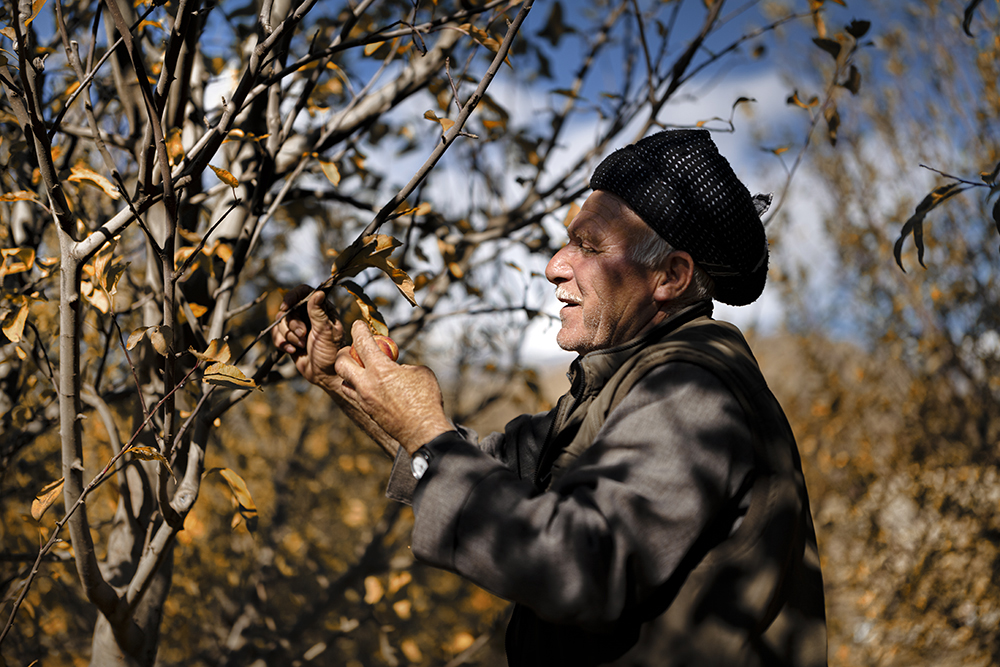
Saeed Mahmoud picks an apple from the orchard on his farm which lies on the border with Iran in the Kurdistan Region of Iraq.
In documenting this experience, Garthwaite was struck by the inherent reverence for nature that anchors the Bakhtiaris' mindful lifestyles, and how although there is no concept of ownership of the land, there is a larger sense of being self-appointed custodians of a stretch of the Zagros mountains. She talks of a return to the ways of old where food, berries and herbs are foraged for, and of a cultivar of wild celery that is "so rare within the Zagros mountains that people defend it and spend 365 days a year, preventing people from stealing it." There are untouched swathes of land that are allowed to grow for three years, where cattle do not graze; and the chance to eat in a seasonally-attuned manner, "picking handfuls of tiny, tiny little apples with their own set of medicinal benefits."
The stories that continue to transfix Garthwaite, however, are those that are rooted in the simplest acts. Sometimes she would "watch Jahan, the mother, just plant a seed with so much love and care," or make a "very clear, yellow ghee with the sweetest honey-like flavor in a leather bag in the morning." Produced from milk fat, Garthwaite goes on to declare it "one of the most delicious things she has tried in her life" and attributes the pronounced profile to the fact that the cattle "survive off perfumed flowers and graze on wild rosemary and thyme."
The opportunity to feed oneself and cook food and provide for your family is one of the greatest forms of empowerment
Displacement is a theme that runs strongly in Emily's work but she tries to change the lens through which we look at these subjects. An observation she made in the camps of displaced refugees in Iraq - those who have been living in them for a long time and not just arrived - is that, "the opportunity to feed oneself and cook food and provide for your family is one of the greatest forms of empowerment."
There is also a charity she's recently been connecting with that has conceived the idea of building community gardens within refugee camps. These, she believes, are incredibly important for bolstering the spirits of those suffering from PTSD and keeping people focused. "It's about abundance and joy and community, and people being brought together by something other than trauma and stress or a need to be together because you're in cramped spaces." The act of growing food thus has the potential to awaken people to much broader questions about the way in which it is a shared humanity.
Garthwaite narrates the dehumanising realities of "barren refugee camps" and talks about one of her closest friends who had been "stuck within the system for a long time". The first thing she did when she left was to plant not an ornamental garden with flowers, but one that would produce food, because food was her way of, "connecting to a land that was not hers but to which she could bring something and grow something from a land that had welcomed her."
Garthwaite attributes the dissociation between food and land today to, "living in a city, traveling quite a lot and just consuming without giving a thought to where it comes from" - something she admits that she can be guilty of herself. She hopes to address this growing sense of disconnect through her work and to be able to, "go to the spaces where people tend to the earth and focus on the way in which land gives people, and heals people and connects people."
Jehan Nizar is an independent features writer and food blogger based in Chennai, India. Her work most often explores food as a point of convergence for history and anthropology and has appeared in national and international publications such as PEN America, Whetstone Magazine, The Spruce Eats, Gulf News, The Wire, The Wire Science, Firstpost and Verve Magazine. She formerly wrote a weekly food column for Asiaville. Jehan is also a core member of faculty at The Asian College of Journalism in Chennai, where she teaches feature writing.
Emily Garthwaite is an award-winning photojournalist, Forbes 30 Under 30 and Leica Ambassador focusing on humanitarian and environmental issues. She has a Masters in Photojournalism and Documentary Photography from the University of Westminster. She is represented by INSTITUTE, is a Member of the Frontline Freelance Register and Fellow of Abraham Path Initiative. She lives between Iraq and the UK. You can learn more about her work at www.emilygarthwaite.com.









